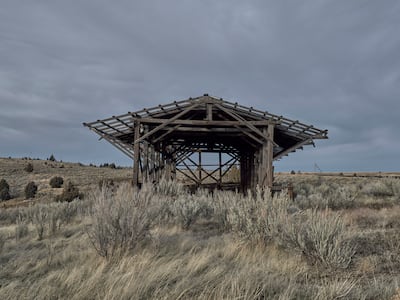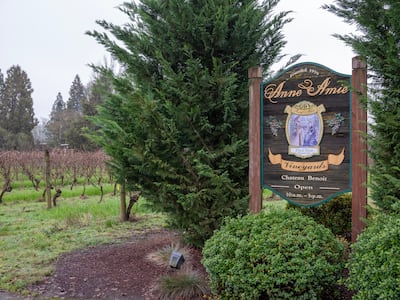Efforts are underway, the Oregon Journalism Project has learned, to unwind one of the great timber fortunes in the state—at the order of the federal government.
On Dec. 26, Dr. Robert Pamplin Jr., 83, settled a lawsuit brought by the U.S. Department of Labor to resolve allegations he treated his company’s pension fund like a piggy bank, selling overvalued company real estate to unwitting pensioners.
Court records show an independent trustee appointed by the feds will sell Pamplin properties all over the state to make the pension fund whole and undo what the feds say are “illegal” real estate transactions Pamplin executed.
Properties that will be sold include the 81,000-acre R2 Ranch, the largest in Central Oregon, which sprawls across Jefferson and Wasco counties, along with two prime Yamhill County wineries and Columbia Empire Farms—at its peak, Oregon’s largest producer of hazelnuts.
Pamplin is the owner and CEO of an industrial holding company, R.B. Pamplin Corp., that his father built and he later took over. He was, until last year, the owner of Pamplin Media Group, the state’s largest newspaper chain.
An ordained minister and philanthropist who says he’s given more than $150 million to charity, Pamplin nonetheless made a remarkable admission right after Christmas.
He conceded in the Dec. 26 filing in U.S. District Court in Portland that he had, over the previous five years, violated a laundry list of federal pension laws, in effect using his company’s pension fund as a bank and diverting tens of millions of dollars from thousands of pensioners whose labor helped make him wealthy. Many of those violations were first reported in the pages of Willamette Week.
As a condition of the settlement, Pamplin agreed to a lifetime ban on serving as a trustee, to make the pension fund whole for all losses, and to pay millions in fines.
“It’s a severe but appropriate penalty,” says Jim Ambrose, a Portland pension lawyer who reviewed the settlement. “What Pamplin did was egregious.”
Pamplin agreed to contribute a variety of assets to make up losses at the pension fund. Simultaneously, the trustee will sell real estate Pamplin illegally placed in the fund. Pamplin’s wife and two daughters also signed the consent agreement, certifying they will be responsible if he fails to pay damages and penalties that will total a minimum of $25 million but could add up to much more.
Pamplin’s downfall saddens people who have known him. “It’s heartbreaking because he did a lot of wonderful philanthropic things,” says property magnate Jordan Schnitzer, who, like Pamplin, has been a major supporter of Lewis & Clark College and the Portland Art Museum. “His father was a legend, but in family businesses, there are a lot of examples of the next generation struggling.”
Pamplin’s attorneys did not respond to a request for comment.
Pamplin’s extensive admission of wrongdoing is a painful outcome for a man who spent decades building his reputation through philanthropy and civic engagement.

The Pamplin name is on the gymnasium at Lewis & Clark College, the business schools at the University of Portland and Virginia Tech (his father’s alma mater), and the Pamplin Historical Park & The Museum of the Civil War Soldier in Virginia, on which Pamplin spent nearly $40 million. Pamplin endowed the directorship at the Portland Art Museum, where he was a longtime board member. He put his portrait—and a caption, “Owner & Neighbor”—on the front page of the Portland Tribune and many of the other 24 newspapers he owned until last year.
Pamplin’s father, Robert Pamplin Sr., made the family fortune as the CEO of Portland-based Georgia-Pacific, then the nation’s largest forest products company. He parlayed his GP earnings into textiles and Ross Island Sand & Gravel, expanding his fortune. He brought his only child, Robert Jr., into the family business, which the younger man diversified, albeit unsuccessfully.
Former Portland City Commissioner Erik Sten spent perhaps more time with Pamplin Jr. than any other public official, negotiating with him over the potential gift of Ross Island to the city of Portland 20 years ago. (The company stopped mining the Willamette River bottom around the island in 2001. Pamplin ultimately gave a small portion of it, 46 acres, to the city.)
“The thing he was always most interested in was his legacy,” Sten says. “That was very clear.”
As a first-time political candidate in 1996, Sten called on Pamplin, who kept an office downtown with his father and often contributed to candidates. In those days, Pamplin appeared on Forbes’ list of the 400 wealthiest Americans (Forbes pegged his net worth at $575 million in 2001). He also commissioned two films about himself and his father, hiring Hollywood actors such as Hal Holbrook and Corbin Bernsen for key roles.
“What I remember about our first meeting is, he gave me a copy of a biography he had commissioned,” Sten says. “It was a big hardback.”
But Pamplin made a series of bad investments: Christian publishing and broadcasting concerns, a string of AM radio stations that extended from Central California to Spokane, Wash., and newspapers among them. He founded the Tribune in 2001, he said, in response to The Oregonian’s coverage of environmental missteps at Ross Island Sand & Gravel. (The coverage was accurate.)
In recent years, Pamplin’s empire showed cracks. His companies often failed to pay their bills, resulting in lawsuits in state and federal courts. His companies also racked up tax liens, which, like the lawsuits, were a sign of growing financial stress.
Instead of seeking outside financing, Pamplin looked to the pension fund, which held more than $100 million in cash, blue chip stocks, and bonds for pensioners’ benefit.
Since 2018, Pamplin has admitted, he illegally sold or contributed 27 different properties owned by the R.B. Pamplin Corp. to the pension fund. Federal law prohibits such transactions because real estate is risky and can be hard to resell. Court records show Pamplin engaged in the transactions over the objection of some senior employees—and the Department of Labor itself.
“Dr. Pamplin and Pamplin Corporation admit that they breached their duty of prudence,” the settlement says. “Defendants admit that they continued to cause the Pension Plan to acquire non-qualifying employer real properties after the Acting Secretary informed Defendants that doing so violated the Employee Retirement Income Security Act.”

Timothy Hauser, a senior Department of Labor official who oversaw the federal investigation of Pamplin, said in an interview that Pamplin’s determination to put his own financial interest ahead of pensioners’ was “singular.”
Hauser says Pamplin violated his duties to pensioners. The real estate transactions Pamplin orchestrated subjected pensioners to excessive risk and were prohibited by federal law.
After Department of Labor staff read about Pamplin’s real estate dealings in Willamette Week, Hauser adds, the agency contacted Pamplin and told him explicitly to stop selling company real estate to the pension fund.
“We told him, look, this is illegal, there’s a categorical prohibition, you can’t do this anymore,” Hauser recalls. But Pamplin subsequently engaged in more transactions.
“These investments were imprudent, they were disloyal. They did not diversify the portfolio and clearly there were significant conflicts of interest,” Hauser says. “If you think about the most fundamental obligations that a pension plan fiduciary has, Dr. Pamplin broke every single one of them.”
Pamplin could execute such transactions because of an unusual arrangement: He acted as the sole trustee for his company’s pension fund.
As the CEO of a troubled company, he needed to raise cash. Instead of selling properties on the market, he offloaded them on unwitting pensioners at prices he alone deemed appropriate, acting as both seller and, as pension fund trustee, buyer.
Some of the assets he sold to pensioners were heavily polluted industrial properties, such as a mothballed concrete plant on the Willamette River in Portland. Often, Pamplin simply sold undivided chunks of ranch or agricultural land, which he did dozens of times over the years. In total, he orchestrated more than 100 such transactions that he valued at more than $60 million.

In September 2024, about two and half years after WW began chronicling Pamplin’s improper transactions (“Trader Bob,” Feb. 23, 2022), the Department of Labor sued Pamplin in U.S. District Court in Portland, accusing him of real estate transactions that were “highly deficient and imprudent.”
On Dec. 26, the parties jointly filed a consent judgment in which Pamplin conceded every allegation the feds made, admitting “all claims that the acting secretary [of Labor] asserted in the complaint filed in this matter against defendants covering the period from April 13, 2018, through September 6, 2023.”
Pamplin agreed to make the pension plan whole. The feds will examine each of the property transactions and calculate how the pension fund would have fared if instead of properties, it had acquired prudently chosen financial assets. An independent trustee, Gallagher Fiduciary Advisors LLC, took control of the pension fund in 2023 and will now dispose of the fund’s real estate.
Pamplin’s sprawling ranch (it’s five and a half times the size of Manhattan) is named after him (R2 means Robert the second). It covers an area in Jefferson and Wasco counties north of Madras that is about 40 miles long and 20 miles wide. At one time, a staff of 20 ran 1,500 head of cattle and grew 10,000 tons of alfalfa hay a year.

Realtors in Yamhill County say the two Pamplin wineries—one in Carlton, the other in Sherwood—are desirable properties, but the market is soft. Even as Pamplin works to comply with the federal settlement, he faces a separate state penalty of $2.9 million levied last year for failing to comply with an order to reclaim Ross Island after 75 years of mining.
Kevin Young, a former president of Pamplin Communications, says he’s glad the feds stepped in to protect pensioners’ interests.
“I’m hoping that this experience with the pension will bring some deep personal reflection,” Young says, “and that he’ll see that the way to improve his reputation is to live up to his promises regarding his debts and the future of Ross Island.”
This story was produced by the Oregon Journalism Project, a nonprofit investigative newsroom for the state of Oregon. OJP seeks to inform, engage, and empower Oregonians with investigative and watchdog reporting that makes a significant impact at the state and local levels. Its stories appear in partner newspapers across the state. Learn more at oregonjournalismproject.org.
HERE’S WHAT PAMPLIN AND HIS COMPANY ADMITTED TO DOING.
HE EXCHANGED INAPPROPRIATE, OVERVALUED REAL ESTATE FOR PENSION FUND DOLLARS: “Dr. Pamplin and Pamplin Corporation sold employer real property to the Pension Plan for the purpose of and with the intent to obtain cash for Pamplin Corporation and the Pamplin Affiliates to the detriment of the best interests of the Pension Plan’s participants and beneficiaries,” the agreement says.
IN SOME CASES, PAMPLIN TOOK ADVANTAGE OF PENSIONERS ON LEASEBACKS: “[Pamplin signed] leaseback agreements with Pamplin Corporation and the Pamplin affiliates that contained highly unfavorable terms to the pension plan.”
SOME OF THE PROPERTIES SOLD TO THE PENSION FUND CARRIED LIABILITIES: Pamplin admitted to “selling and contributing to the Pension Plan certain employer real property saddled with unpaid property taxes or other encumbrances that Pamplin Corporation and the Pamplin Affiliates had failed to pay or clear, thereby reducing their value.”
PAMPLIN OBTAINED INFLATED APPRAISALS FOR POLLUTED ROSS ISLAND SAND & GRAVEL PROPERTIES—AND DIDN’T BOTHER READING THEM: “Dr. Pamplin and Pamplin Corporation caused the pension plan to acquire Ross Island Property (appraised value of $10,600,000) and Tait Property (appraised value of $4,800,000) using appraisals that did not account for significant environmental issues that reduced their fair market values below the appraised values. Defendants also failed to read the appraisal reports to confirm that the appraisers had accounted for these environmental issues.” The settlement requires Ross Island Sand & Gravel to take back the two properties and replace them in the pension fund with other assets.
CRIMINAL CHARGES AGAINST PAMPLIN REMAIN A POSSIBILITY: “Nothing in this Consent Judgment shall preclude the Acting Secretary from…instituting, recommending, and or referring for any criminal proceeding.”
